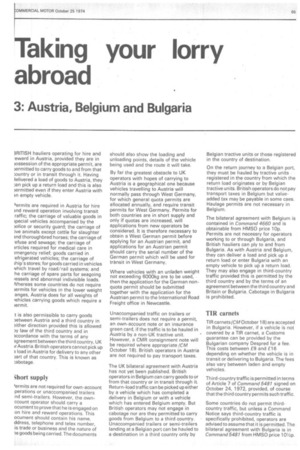Taking your lorry abroad
Page 67

If you've noticed an error in this article please click here to report it so we can fix it.
3: Austria, Belgium and Bulgaria
3RITISH hauliers operating for hire and • eward in Austria, provided they are in )ossession of the appropriate permit, are )ermitted to carry goods to and from that ;ountry or in transit through it. Having ielivered a load of goods to Austria, they an pick up a return load and this is also )ermitted even if they enter Austria with in empty vehicle.
permits are required in Austria for hire 3 n d reward operation involving transit raffic; the carriage of valuable goods in ;pecial vehicles accompanied by the )olice or security guard; the carriage of ive animals except cattle for slaughter Ind thoroughbred horses; the carriage of 'efuse and sewage; the carriage of Kticles required for medical care in 3mergency relief; goods carried in .efrigerated vehicles; the carriage of ;hip's stores; for goods carried in vehicles which travel by road/rail systems; and he carriage of spare parts for seagoing iessels and abnormal indivisible loads. IVhereas some countries do not require )errnits for vehicles in the lower weight anges, Austria does for all weights of eehicles carrying goods which require a )ermit.
t is also permissible to carry goods petween Austria and a third country in ?ither direction provided this is allowed )y law of the third country and in 3ccordance with the terms of any 3greement between the third country, UK irAustria.British operators cannot pick up
load in Austria for delivery to any other )art of that country. This is known as 3a botage.
ihort supply
'ermits are not required for own-account perations or unaccompanied trailers nd semi-trailers. However, the ownccount operator should carry a ocument to prove that he is engaged on on hire and reward operations. This ocument should contain his name, ddress, telephone and telex number, is trade or business and the nature of le goods being carried. The documents should also show the loading and unloading points, details of the vehicle being used and the route it will take.
By far the greatest obstacle to UK operators with hopes of carrying to Austria is a geographical one because vehicles travelling to Austria will normally pass through West Germany, for which general quota permits are allocated annually, and require transit permits for West Germany. Permits for both countries are in short supply and only if quotas are increased, will applications from new operators be considered, It is therefore necessary to obtain a West German permit before applying for an Austrian permit, and applications for an Austrian permit should carry the serial number of the German permit which will be used for transit in West Germany., Where vehicles with an unladen weight not exceeding 6000kg are to be used, then the application for the German nonquota permit should be submitted together with the application for the Austrian permit to the International Road Freight office in Newcastle.
Unaccompanied traffic on trailers or semi-trailers does not require a permit, an own-account note or an insurance green card, if the traffic is to be hauled in Austria by a non-UK tractive unit. However, a CMR consignment note will be required where appropriate (CM October 18). British operators in Austria are not required to pay transport taxes.
The UK bilateral agreement with Austria has not yet been published. British operators in Belgium can carry goods to or from that country or in transit through it. Return-load traffic can be picked up either by a vehicle which has completed a delivery in Belgium or with a vehicle which has entered Belgium empty. But British operators may not engage in cabotage nor are they permitted to carry goods from Belgium to a third country. Unaccompanied trailers or semi-trailers landing at a Belgian port can be hauled to a destination in a third country only by Belgian tractive units or those registered in the country of destination.
On the return journey to a Belgian port, they must be hauled by tractive units registered in the country from which the return load originates or by Belgian tractive units. British operators do not pay transport taxes in Belgium but valueadded tax may be payable in some caes. Haulage permits are not necessary in Belgium.
The bilateral agreement with Belgium is contained in Command 4660 and is obtainable from HMSO price 10p. Permits are not necessry for operators working to or through Bulgaria, and British hauliers can ply to and from Bulgaria. As with Austria and Belgium, they can deliver a load and pick up a return load or enter Bulgaria with an empty vehicle to pick up a return load. They may also engage in third-country traffic provided this is permitted by the third country and by the terms of an agreement between the third country and Britain or Bulgaria. Cabotage in Bulgaria is prohibited.
TIR carnets
TIR carnets(CM October 18) are accepted in Bulgaria. However, if a vehicle is not covered by a TIR carnet, a Customs guarantee can be provided by the Bulgarian company Despred for a fee. This costs between £9 and £16 depending on whether the vehicle is in transit or delivering to Bulgaria. The fees also vary between laden and empty vehicles.
Third-country traffic is permitted in terms of Article 7 of Command 5481 signed on October 24, 1972, provided, of course that the third country permits such traffic.
Some countries do not permit thirdcountry traffic, but unless a Command Notice says third-country traffic is specifically prohibited, operators are advised to assume that it is permitted. The bilateral agreement with Bulgaria is in Command 5481 from HMSO price 101/2p.












































































































































